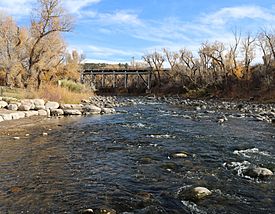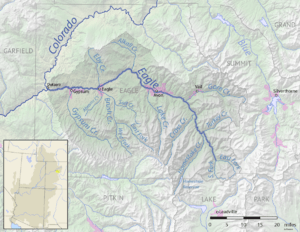Eagle River (Colorado) facts for kids
Quick facts for kids Eagle River |
|
|---|---|

The river at Eagle's Chambers Park
|
|

Eagle River drainage basin
|
|
| Physical characteristics | |
| Main source | Confluence of East Fork and South Fork 39°25′18″N 107°03′26″W / 39.42167°N 107.05722°W |
| River mouth | Confluence with Colorado River 6,122 ft (1,866 m) 39°38′47″N 107°03′26″W / 39.64639°N 107.05722°W |
| Length | 60.5 mi (97.4 km) |
| Basin features | |
| Progression | Colorado |
| Basin size | 945 sq mi (2,450 km2) |
The Eagle River is a river in west-central Colorado, United States. It is about 60.5 mi (97.4 km) long. The Eagle River is a "tributary," which means it flows into a larger river. It joins the mighty Colorado River.
Contents
About the Eagle River
The Eagle River starts in southeastern Eagle County. This area is near the continental divide. The continental divide is like a big ridge. It separates rivers that flow to the Pacific Ocean from those that flow to the Atlantic Ocean.
Where Does It Start and Go?
The river begins where two smaller streams meet. These are the East Fork Eagle River and the South Fork Eagle River. From there, it flows mostly northwest. It passes by several towns. These include Gilman, Minturn, and Avon.
Near a place called Wolcott, the river changes direction. It turns and flows west. It then goes past the towns of Eagle and Gypsum. Finally, the Eagle River meets the Colorado River. This meeting point is at Dotsero.
How Much Water Flows?
The amount of water in the Eagle River changes a lot. In late summer, during dry years, it can be quite low. It might flow at about 200 cu ft/s (5.7 m3/s). But in the spring, when snow melts, the river gets much bigger. This is called "spring runoff." During this time, the flow can reach up to 7,000 cu ft/s (200 m3/s). That's a huge difference!
Keeping the River Healthy
Sometimes, water from old mines can flow into the river. This can make the water less clean. For example, water from the old Eagle Mine has affected the river. People are working hard to clean up these areas. Their goal is to keep the Eagle River healthy for everyone. This includes the animals that live there and people who enjoy the river.
Images for kids
 | Delilah Pierce |
 | Gordon Parks |
 | Augusta Savage |
 | Charles Ethan Porter |


